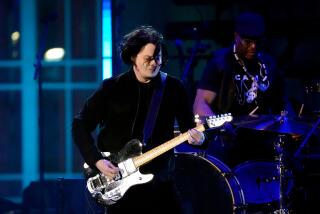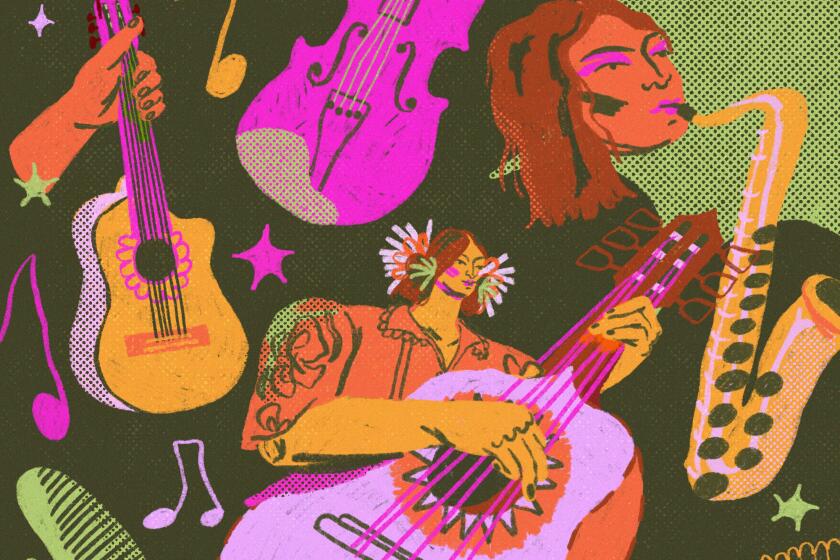Review: Lana Del Rey’s ‘Ultraviolence’: Defiant seduction from pop instigator ★★★
If there’s a central message to “Ultraviolence,” the highly anticipated new album by Lana Del Rey, it is this: Why mind Facebook executive Sheryl Sandberg’s advice that a modern woman “lean in” when she can get what’s desired through reclining?
Filled with the kind of echoed, distant seduction that has made the young chanteuse-instigator one of the most polarizing pop stars in recent memory, Del Rey’s follow-up to her multi-platinum “Born to Die” is rife with incitements and further defines her philosophy, one that’s as provocative in its own way as punk rock but without all that screaming.
This belief system on “Ultraviolence” preaches a cut-throat approach to finding and retaining bliss. Put on a red dress on the album’s opener, “Cruel World,” seduce a famous man with “a little bit of bourbon” and tell him you’re crazy.
Examine domestic violence on the title track with meaty lines such as “he hurt me but it felt like true love,” but include more questions than answers. Stare unflinchingly at pure, blind desire.
Desire is the most potent drug on “Ultraviolence,” an 11-song record featuring Del Rey’s trademarked tone, one with the sonic feel of a fading Polaroid and a languorous approach that, depending on your mood and constitution, will sound either lethargic to the point of nodding off or as blissfully relaxing as a massage.
Del Rey popped through the clutter of 2011 when she released “Video Games,” a chrome-toned brushoff of a lover that featured an Americana-infused sound as indebted to musical noir as it was to modern pop.
With a relaxed vibe that pushed the melodrama of a 1970s soap opera at the expense of sonic aggression, “Video Games” and the other hits from “Born to Die” were as singular in their own way as more “forward-thinking” mainstream pop stars such as Kanye West and Beyonce.
Since that arrival, Del Rey has been dismissed as a poser, has been belittled as inauthentic (her real name is Elizabeth Grant), and has been the subject of more critical ink that virtually any other current pop star. She’s been defended by writers calling out the sexism; many of the critiques dubbed her a fake while ignoring that mask-wearing has been a central part of male-dominated pop music since Day 1.
At the same time, she alienated the very thinkers who came to her defense by recently calling feminism “just not an interesting concept,” then adding that she was more interested in “SpaceX and Tesla -- what’s going to happen with our intergalactic possibilities.”
But within all that hoopla, though, is a central truth: Musically and lyrically, Del Rey possesses a pure kernel of individualism that’s not only admirable but worthy of celebration. No one else sounds like her.
Where more prominent pop stars trade in a dazzling brand of empowered sexuality, on “Ultraviolence” Del Rey focuses on the unfortunate truths and the nuances, contrived as they sometimes may be, more eager to paint a picture than to analyze it.
The contrivances are there, mostly in the form of oddball American signifiers that dot each song with telling accents. Her man drives a Chevy Malibu. The “other woman” will prevail because unlike the wife, she’s never seen with “pin-curls in her hair anywhere.”
On bonus track “Is This Happiness?” she describes being “high up in the Hollywood Hills crushing violet pills.” “Old Money” trades in “cashmere, cologne and white sunshine/Red racing cars, Sunset and Vine.” Each little placement adds to the mystique.
Produced by Dan Auerbach, the Grammy-winning singer and guitarist for the Black Keys, the album doubles down on what she and her producer have aptly described as “narco-swing”: Soft, billowy production heavy on melodramatic strings and perfectly placed wah-wah guitar, easy on the rhythms and synthetics. It’s a candlelit record, a 3 a.m. record. Turn it up loud and melt into the couch.
The tension will swirl as Del Rey’s voice roams, stronger and more assured than on her last record. With this tone come myriad romantic battles. She battles herself, she battles spurned women and desirable men. She’s a brat with an attitude on “Shades of Cool”: “When he calls, he calls for me and not for you,” she brags, “He lives for love, he loves his drugs, he loves his baby, too.”
She defiantly defends the plight of the other woman in “Sad Girl” with an opening verse sure to anger cuckolds everywhere: “Being a mistress on the side/It might not appeal to fools like you/Creeping around on the side/Would not be something you would do.” Del Rey then admits to the downside of the equation in “The Other Woman,” which acknowledges the dangers of such arrangements.
It’s this brand of tension that feeds “Ultraviolence,” a kind of willfully woozy series of contradictions that combine to create a convincing argument. Whether it’s one you echo or despise, one that you’ll will lean in to hear or lie back and absorb, Del Rey doesn’t seem to care. Unless she does.
------------------------
Lana Del Rey
“Ultraviolence”
(Interscope)
Three stars
Follow Randall Roberts on Twitter: @liledit
More to Read
The biggest entertainment stories
Get our big stories about Hollywood, film, television, music, arts, culture and more right in your inbox as soon as they publish.
You may occasionally receive promotional content from the Los Angeles Times.











